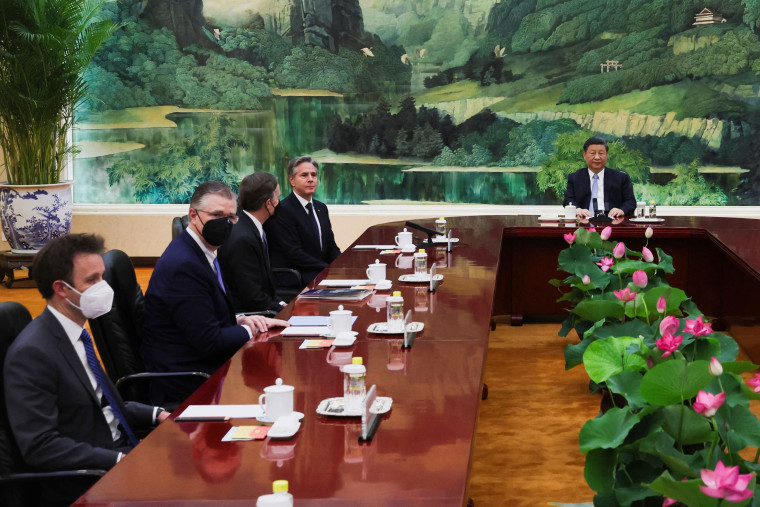[ad_1]
Blinken’s meetings with Xi and others were expected to touch on a number of areas of dispute including trade, Taiwan, human rights, Chinese military aggression in the South China Sea and Russia’s war in Ukraine.
Blinken met earlier with Wang Yi, China’s top diplomat, and with Chinese Foreign Minister Qin Gang.
State Department officials had said the two countries were unlikely to reach any breakthroughs during Blinken’s trip, which had originally been planned for February but was postponed after the discovery of a suspected Chinese spy balloon over U.S. territory.
China, while emphasizing the importance of resuming high-level communication, had also expressed less enthusiasm ahead of Blinken’s visit this week than it did before the earlier trip was postponed.
But it could lay the groundwork for a meeting later this year between Biden and Xi, who last met in Indonesia last November on the sidelines of a summit of the Group of 20 major economies.
Biden told reporters on Saturday that he hoped to meet with Xi in the coming months to discuss “legitimate differences we have but also how there’s areas we can get along.”
After arriving on Sunday, Blinken met with Qin, China’s foreign minister, for talks that both sides described as “candid” and “constructive.” Those talks lasted for almost six hours, followed by a two-hour working dinner, according to senior State Department officials.
The two countries said Qin, who was previously the Chinese ambassador to the United States, had accepted an invitation from Blinken to visit the U.S. at a mutually suitable time.

Blinken then had a three-hour meeting on Monday with Wang Yi, China’s top diplomat, that appeared to be a little more fractious.
Wang blamed the United States’ “wrong perception” of China for the poor relations between the two countries and said Washington had to make a choice “between dialogue and confrontation, and cooperation and conflict.”
He said it was important to reverse the “downward spiral” in the relationship, return it to a healthy and stable path and “jointly explore the right way for China and the United States to get along with each other in the new era.”
Wang asked that the U.S. lift sanctions on Chinese entities and stop suppressing China’s technological development, a reference to U.S. export controls on semiconductor technology. He also emphasized China’s position on Taiwan, a self-ruling democracy that Beijing claims as its territory and whose status is one of the biggest flashpoints in U.S.-China relations.
China has accused the U.S., Taiwan’s most important international backer, of promoting Taiwan independence through official exchanges between the island’s president and senior U.S. officials such as former House Speaker Nancy Pelosi and her successor, Kevin McCarthy. The Biden administration denies that U.S. policy on Taiwan has changed.
On the question of Taiwan, “China has no room for compromise or concession,” the readout said.
Blinken “underscored the importance of responsibly managing the competition between the United States and [China] through open channels of communication to ensure competition does not veer into conflict,” State Department spokesperson Matthew Miller said in a statement.
The secretary also “reiterated that the United States will continue to use diplomacy to raise areas of concern and stand up for the interests and values of the American people.”
Evelyn Cheng, CNBC, Murphy Zhao and Abigail Williams contributed.
[ad_2]
Source link
